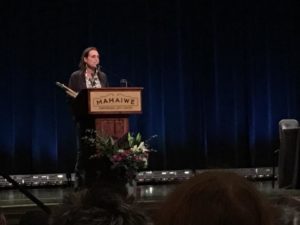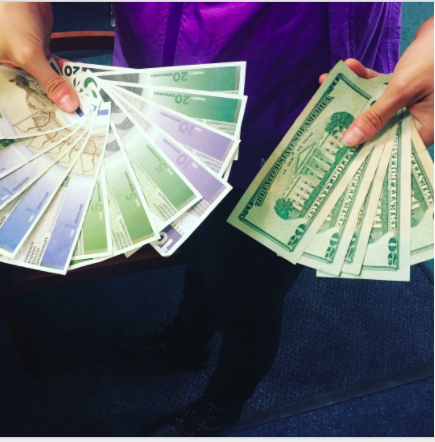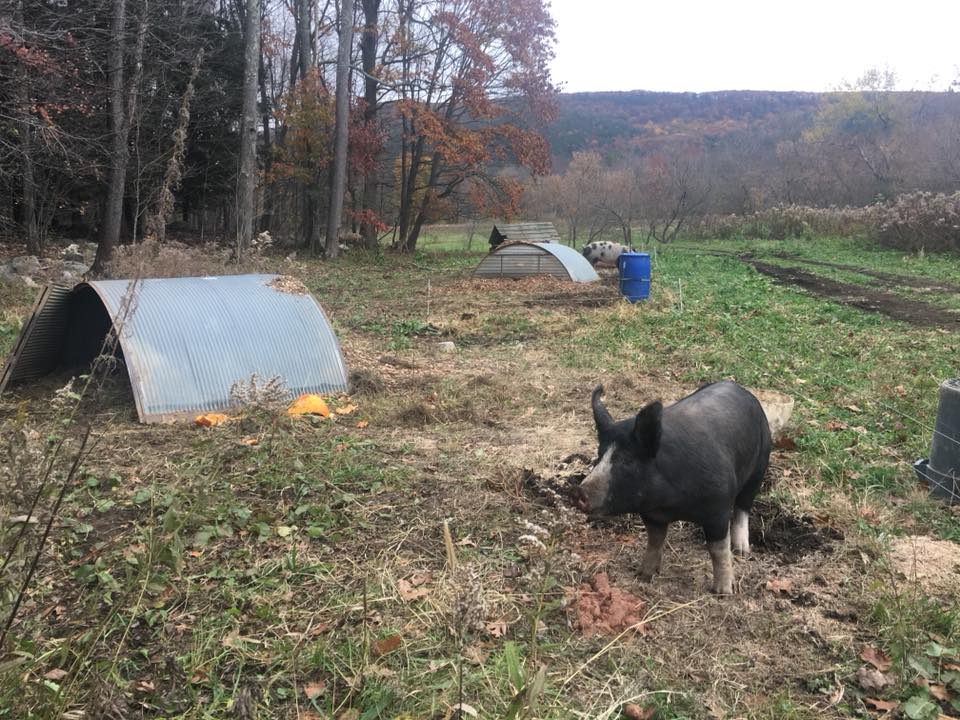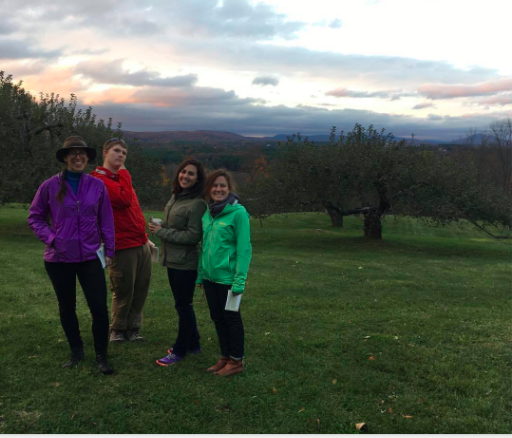
Winona LaDuke delivering the 37th annual Schumacher Lecture keynote.
“How can we deconstruct the dysfunctions of our economic system?” asked economist and activist Winona LaDuke. She spoke to a full theater at the Mahaiwe Performing Arts Center in Great Barrington, MA on Saturday, November 4th – an audience that included 12 UEP students. She added, “Because the way we’re going, it seems like people don’t wanna hang around for another thousand years.”
Shifting our economic system away from an extractive, exploitative worldview to one that supports people and the planet was the topic of the day, and in fact the whole weekend. First year UEP student Alice Maggio, a Berkshire native and former employee of the Schumacher Center for a New Economics, took the initiative to bring a group of classmates to her hometown to explore the demiurgic economic initiatives and programs in the area. Earlier this semester, together with fellow first year David Morgan, Alice had revitalized the Tufts New Economy student group that was formed in 2013 by UEP student Marcy Ostberg. Maggio and Morgan both have experience working in the “new economy” realm, sometimes also called the “solidarity economy” movement. Encouraged by interest from classmates, they have convened the Tufts New Economy group as a forum for exploration of economic models and initiatives that advance justice, equity, and ecological sustainability. The field trip to the Berkshires was the first big action by Tufts New Economy this year.
Now, in the audience of the Mahaiwe Theater, we were on the receiving end of a torrent of harsh truths about our corrupt economic reality and the vast harms it has caused since Europeans first started arriving in North America. Dispossession of Black and indigenous people, environmental degradation, and colossal economic inequality were all explored in LaDuke’s keynote and an all-star panel of speakers including Black Lives Matter activist Karissa Lewis, Movement Generation educator Gopal Dayaneni, and Schaghticoke First Nations Sachem Robert Hawk Storm.

Exchanging 95 US Dollars for 100 BerkShares at Lee Bank in Great Barrington.
But the weekend wasn’t all doom and gloom – as the speakers, vocal Water Protectors in the audience, and examples of flourishing economic experiments in the Berkshires provided measures of hope for positive change.
Immediately upon arriving in Great Barrington the day before, we stopped at Lee Bank to exchange our U.S. Dollars for BerkShares. The multi-colored notes pictured to the right are a local currency launched in 2006 and distributed throughout the region at 16 branch offices of four local banks. The cash, beautifully illustrated with portraits of local heroes and landscapes, can be spent at more than 400 Berkshire businesses. Like landing in a foreign country and exchanging money, we felt we were now in a distinct and separate place unlike any other in the U.S.
The group also had the opportunity to visit the Schumacher Center itself, where the ideas for BerkShares and Community Supported Agriculture (CSA) were born. We then toured Indian Line Farm, the first to use the CSA model, which is just down the road from the Schumacher Center’s offices.

Indian Line Farm, the first CSA in the United States.
As a complement to this foray into experimental local economics, we also got a taste for local politics. On Saturday before the lecture, Alice introduced us to Great Barrington’s Town Manager Jennifer Tabakin over lunch, where we asked her about rural economic development and its attendant challenges. On Sunday, we toured another favorite local farm – Sean Stanton’s North Plain Farm, which grows tomatoes and provides beef, pork, milk and eggs for chef, author, and thought leader Dan Barber’s restaurants Blue Hill and Blue Hill at Stone Barns. Sean also serves as the president of Great Barrington’s Selectboard, so he let us in on how local, state, and federal policies affect small-town governance and family farms.
The whirlwind weekend left us with our brains whirring and our coats smelling like woodsmoke. To reflect together and to share what we had learned with other UEP students and faculty, Tufts New Economy hosted a “Talk Back” with those who had participated on the field trip on November 16th. Themes of radical revisioning, frustration, and difficulty communicating these issues to friends and loved ones outside of the Tufts learning community were discussed and explored.
Given the devastating impacts our global, neoliberal capitalist economy has had on environment, equality, and autonomy, it’s obvious there are still oceans to explore.
Anyone interested in learning more about Tufts New Economy is welcome to send an email to Alice or David.
More photos from the trip:

Learning about how policy affects local agriculture from farmer and Selectman Sean Stanton at Blue Hill Farm.

In the apple orchard at the Schumacher Center, on Community Land Trust land.

View from Great Barrington Town Hall, where we met the Town Manager Jennifer Tabakin.